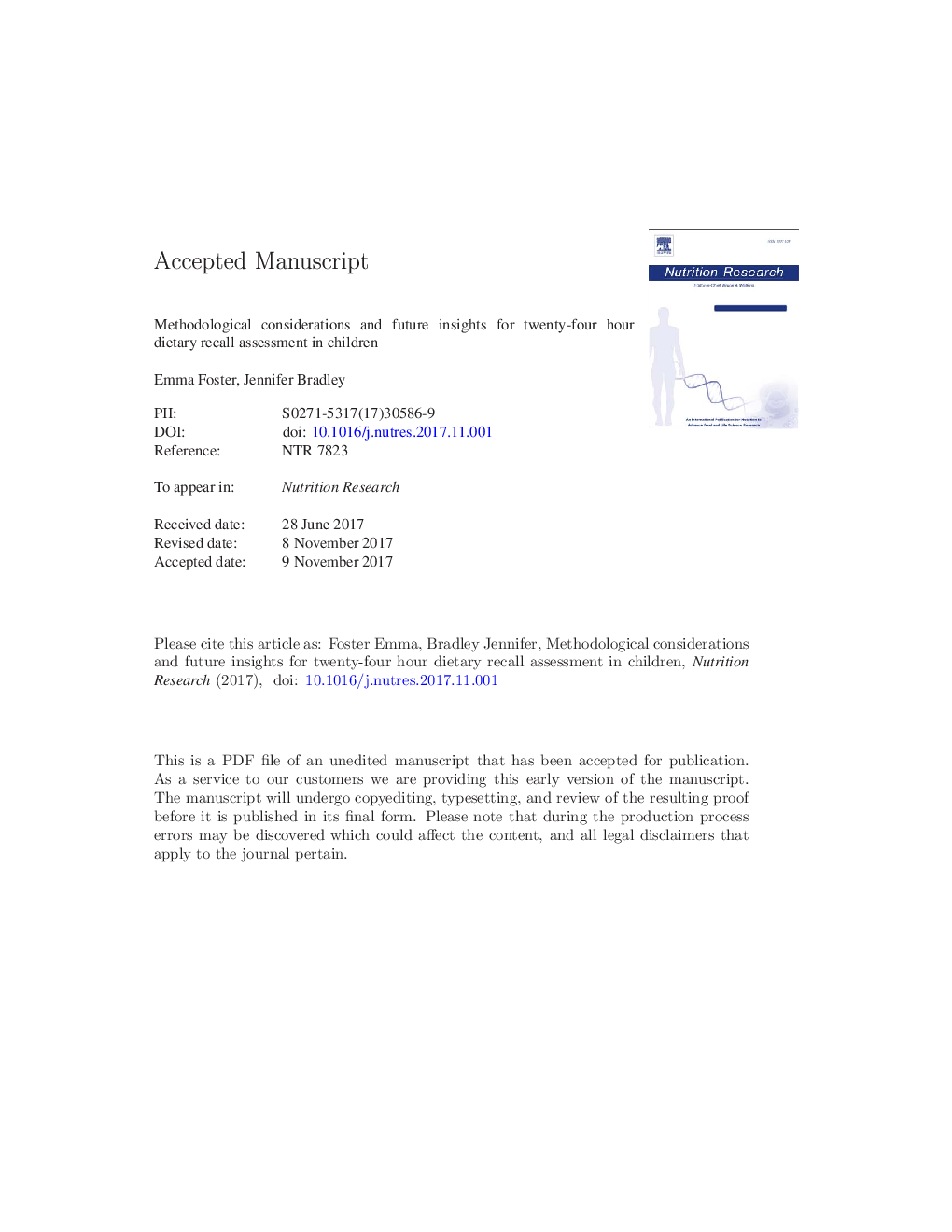| کد مقاله | کد نشریه | سال انتشار | مقاله انگلیسی | نسخه تمام متن |
|---|---|---|---|---|
| 8634236 | 1569094 | 2018 | 33 صفحه PDF | دانلود رایگان |
عنوان انگلیسی مقاله ISI
Methodological considerations and future insights for 24-hour dietary recall assessment in children
ترجمه فارسی عنوان
ملاحظات روش شناختی و بینش های آینده برای ارزیابی یادآوری 24 ساعته غذایی در کودکان
دانلود مقاله + سفارش ترجمه
دانلود مقاله ISI انگلیسی
رایگان برای ایرانیان
کلمات کلیدی
BMRNHANESDLWDoubly-labeled waterDietary assessment - ارزیابی رژیم غذاییMethodology - روش شناسیDiet - رژیم غذایی24-hour recall - فراخوان 24 ساعتهEnergy intake - مصرف انرژی basal metabolic rate - میزان متابولیسم پایهBiomarkers - نشانگر زیستی یا بیومارکرNational Health and Nutrition Examination Surveys - نظرسنجی ملی بهداشت و تغذیهChildren - کودکان
ترجمه چکیده
ارزیابی رژیم غذایی به شدت مورد انتقاد شدید قرار گرفته است تا اینکه تا به حال مورد سوال قرار گرفته است که آیا روش های خود ارزیابی ارزیابی رژیم در همه موارد ارزش دارد. کم گزارش شده از مصرف انرژی، محدودیت های ناشی از حافظه، تغییر در مصرف به علت بارگیری ضبط و تعصب مطلوبیت اجتماعی به طور قابل توجهی بر دقت اطلاعات رژیمی جمع آوری شده تاثیر می گذارد. در گزارش های مصرف انرژی به عنوان یک مشکل در پژوهش های رژیم غذایی با اندازه گیری های دوگانه برچسب آب مصرف انرژی به رسمیت شناخته شده است که نشان می دهد گزارش های قابل توجهی از مصرف انرژی در سراسر جمعیت های مختلف و روش های مختلف ارزیابی رژیم غذایی. در این بررسی ما در ارزیابی رژیم غذایی با کودکان با توجه ویژه به روش یادآوری 24 ساعته تمرکز می کنیم. ما به سطح زیر گزارش از مصرف انرژی نگاه می کنیم و این که چگونه این تغییر با سن، جنسیت و شاخص توده بدنی تغییر می کند. ما در مورد گزینه های بالقوه برای روش های ارزیابی رژیم غذایی خود (یا پروکسی گزارش شده) با کودکان، مانند نشانگرهای زیستی، و همچنین چگونگی جمع آوری اطلاعات مهم برای تغذیه سلامت عمومی مانند روش پخت و پز، مخلوط غذا خورده با هم یا زمینه که در آن مواد غذایی مصرف می شود. ما نتیجه گرفتیم که علیرغم تمام چالش ها و ضعف ها، داده های جمع آوری شده با استفاده از روش های ارزیابی رژیم خود گزارش شده بسیار ارزشمند هستند. تحقیقات در زمینه روش ارزیابی رژیم غذایی، افزایش در درک ما از محدودیت های روش های خود گزارش شده و پیشرفت های پیشرفته در دقت داده های جمع آوری شده را افزایش داده است. از این رو، سرمایه گذاری های آینده در نظارت بر رژیم غذایی و بهبود روش های مصرف خود گزارش شده می تواند کمک های حیاتی به درک ما از مصرف رژیم غذایی داشته باشد و بنابراین ضروری است.
موضوعات مرتبط
علوم زیستی و بیوفناوری
بیوشیمی، ژنتیک و زیست شناسی مولکولی
علوم غدد
چکیده انگلیسی
Dietary assessment has come under much criticism of late to the extent that it has been questioned whether self-reported methods of dietary assessment are worth doing at all. Widespread under-reporting of energy intake, limitations due to memory, changes to intake due to the burden of recording and social desirability bias all impact significantly on the accuracy of the dietary information collected. Under-reporting of energy intakes has long been recognized as a problem in dietary research with doubly labeled water measures of energy expenditure uncovering significant under-reporting of energy intakes across different populations and different dietary assessment methods. In this review we focus on dietary assessment with children with particular attention on the 24-hour dietary recall method. We look at the level of under-reporting of energy intakes and how this tends to change with age, gender and body mass index. We discuss potential alternatives to self-reported (or proxy-reported) dietary assessment methods with children, such as biomarkers, and how these do not enable the collection of information important to public health nutrition such as the cooking method, the mixture of foods eaten together or the context in which the food is consumed. We conclude that despite all of the challenges and flaws, the data collected using self-reported dietary assessment methods are extremely valuable. Research into dietary assessment methodology has resulted in significant increases in our understanding of the limitations of self-reported methods and progressive improvements in the accuracy of the data collected. Hence, future investment in dietary surveillance and in improving self-reported methods of intake can make vital contributions to our understanding of dietary intakes and are thus warranted.
ناشر
Database: Elsevier - ScienceDirect (ساینس دایرکت)
Journal: Nutrition Research - Volume 51, March 2018, Pages 1-11
Journal: Nutrition Research - Volume 51, March 2018, Pages 1-11
نویسندگان
Emma Foster, Jennifer Bradley,
